Middle East
Hezbollah is undeterred as Lebanon braces for war with Israel
The Washington Post August 11, 2024
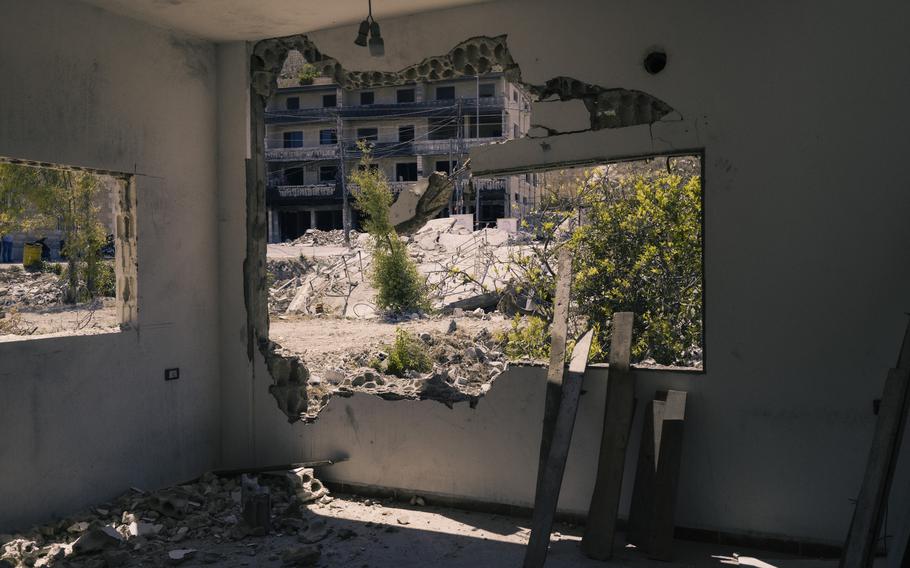
The site of a June 6, 2024, airstrike by Israeli forces that hit Lebanon’s Wadi Jilo. The attack leveled one building, damaged another and caused a third to catch fire. Twenty people were injured in the strike. (Lorenzo Tugnoli for The Washington Post)
WADI JILO, Lebanon — An Israeli strike that killed a Hezbollah fighter traveling a rural road here last week left a blasted car, a scorched patch of earth and the Israeli claim that the attack had dealt a “significant blow” to its enemy across the border.
But there seemed to be plenty of young men willing to take the place of the fighter, Ali Abdul Ali, in his hometown in southern Lebanon, less than two miles from the spot where he was killed. They were seen crowding around his flower-decked coffin in footage of his funeral last week, where local grief and anger mingled with the party supporter’s zeal. “Hezbollah,” they chanted.
Ten months after entering the conflict between Israel and its ally Hamas, Hezbollah, the Lebanese militant group and political party, appears undeterred after absorbing withering blows from Israeli strikes and the killing of nearly 400 fighters and commanders. Hezbollah has only paused its strikes into northern Israel once, back in November. More recently, it has ratcheted up the intensity of its attacks and broadened its list of targets to include Israeli towns it said it had not previously hit.
Hezbollah’s persistence has bedeviled the Biden administration, Israel’s principal ally. U.S. efforts to stave off regional war — one in which it would inevitably be involved — have included failed attempts at brokering cease-fires in both Lebanon and the Gaza Strip. Hezbollah has said it does not want war but will stop firing only when a cease-fire is reached in Gaza.
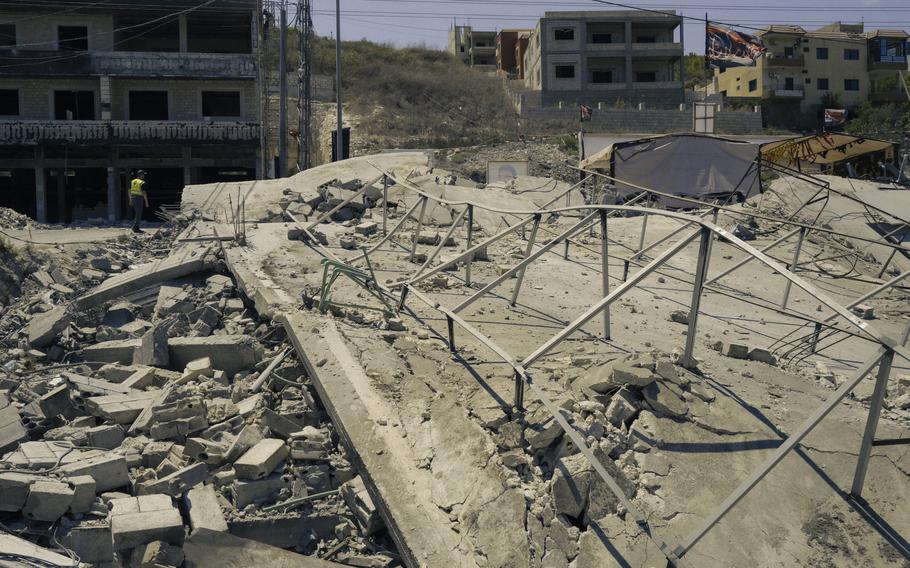
A member of Lebanon’s civil defense force walks near the site of a strike in June on the town of Wadi Jilo in southern Lebanon on Aug. 4, 2024. (Lorenzo Tugnoli for The Washington Post)
On Thursday, the United States, Qatar and Egypt issued a joint statement urging Hamas and Israel to resume negotiations as Israel braced for retaliation from Hezbollah and its patron Iran for the killing of a senior Hezbollah commander in Beirut’s suburbs and a Hamas leader in Tehran.
“There is no further time to waste,” the statement said.
As it fights, Hezbollah has been the standard-bearer for the Iran-allied “axis of resistance,” buoyed by its status as Lebanon’s unrivaled military force, its vast arsenal of weapons and its tens of thousands of men under arms. As suffering has spread in Lebanon, Hezbollah has tried to blunt opposition to its military operations by arguing its tactics have limited the spread of violence and kept its battles with Israel from breaking out into a wider conflict.
By largely confining the fighting to Lebanon’s southern border regions, it “created less of a problem than it might have if they had started a major conflict,” said Michael Young, a Beirut-based senior editor at the Carnegie Middle East Center. There had been a “separation” in Lebanon, between the destruction Israel’s strikes had visited on the south and the reality elsewhere in the country where “life goes on,” he said.
Because of that separation, as well as a widely shared revulsion in Lebanon at the “brutality” of Israel’s Gaza offensive, Hezbollah had been able to keep a “lid on discontent,” he said.
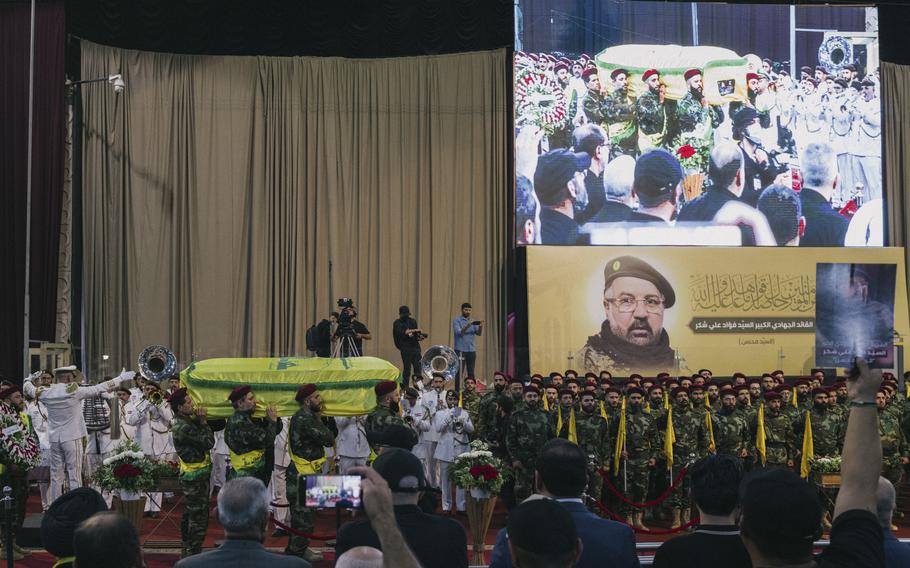
Mourners attend the funeral procession of Hezbollah commander Fuad Shukr, who was killed along with six other people including children in an Israeli airstrike in Beirut’s southern suburbs in July. (Lorenzo Tugnoli for The Washington Post)
But Ibrahim Mneimneh, an independent member of Lebanon’s parliament, said the toll of war in southern Lebanon was severe enough to question Hezbollah’s strategy. “I don’t believe that they were able to protect Lebanon through what they used to call the ‘equation of deterrence,’” he said, referring to the notion that neither Israel nor Hezbollah wanted to escalate beyond a certain point.
And maintaining the balance Hezbollah had sought was becoming far more difficult. Fears that hostilities could spiral surged in late July, after a strike that killed 12 children in the Israeli-occupied Golan Heights. Israel and the United States blamed Hezbollah, which denied it was responsible. A few days later, an Israeli missile tore through a residential building in Beirut’s southern suburbs that killed Fuad Shukr, a senior Hezbollah commander, and at least six other people, including two children.
“We did not go to escalation, even when our dear leaders were killed,” Hezbollah secretary general Hasan Nasrallah said in a speech Tuesday, mentioning the dual realities in Lebanon. “For 10 months, there’s been a front, martyrs and funerals, and another part of Lebanon where it’s concerts, and leisure, and lunches and dinners,” he said. But the “aggression” against Shukr, a few miles from downtown Beirut, was different.
“The Israelis are the ones who chose this escalation with Lebanon,” he said.
In a speech that seemed designed to prepare Lebanon for war, “the tone has changed,” Young said.
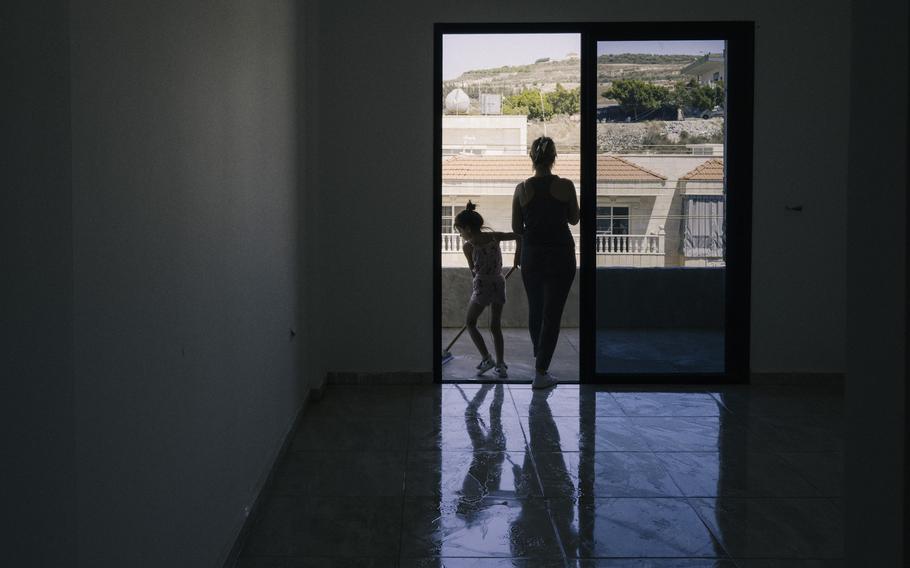
A woman and her young daughter clean an apartment where she is resettling with her family. Her previous apartment, in the same building, was burned down after an Israeli airstrike hit Wadi Jilo in early June. (Lorenzo Tugnoli for The Washington Post)
“We are in a situation where the rhythm imposed by Hezbollah trying to contain the conflict is no longer possible, it seems — partly because the Israelis appear willing to expand it,” Young said. The speech focused less on Hezbollah’s role in the constellation of Iran-backed armed groups, instead explaining to a broader Lebanese audience why Israel was a threat to the region and Hezbollah’s fight was necessary, he said.
Even that was a hard sell, since no one in Lebanon — including Hezbollah’s supporters among the country’s Shiite Muslim community — wanted a war, he added.
The devastation to Lebanese homes and farms is concentrated along the border with Israel, after months of battle in which Israeli strikes outnumbered those by Hezbollah by more than 6 to 1, according to figures through Aug. 1 compiled by ACLED, an organization that collects data on conflict. More than 100,000 people have been displaced by the fighting, which has killed 114 civilians and noncombatants in Lebanon.
On the other side of the border, more than 60,000 people remain displaced from communities in northern Israel since Hezbollah initiated hostilities on Oct. 8. 19 soldiers and 24 civilians have been killed in attacks by the group. Hundreds of homes have by damaged and tens of thousands of acres have been burned in wildfires ignited by drone and rocket strikes.
In Lebanon, the suffering extends miles from the frontier, to Wadi Jilo, where families in a three-story building that was set ablaze by an Israeli strike across the street in early June were only just returning to their homes. Workers and painters — some themselves displaced by the fighting — tried to make the place habitable again.
One of the workers, who is Syrian, said he was commuting back and forth daily to a ghost town closer to the front line; Syrian refugees in Lebanon, facing discrimination, have struggled to find people willing to take them in.
A housewares supply company on the ground floor of the building was destroyed. “How we managed to escape, I don’t know,” said Mervat Eitawi, 49, who lived on the first floor and spent three days in the hospital after the strike with breathing problems, she said. Her son’s arm was burned.
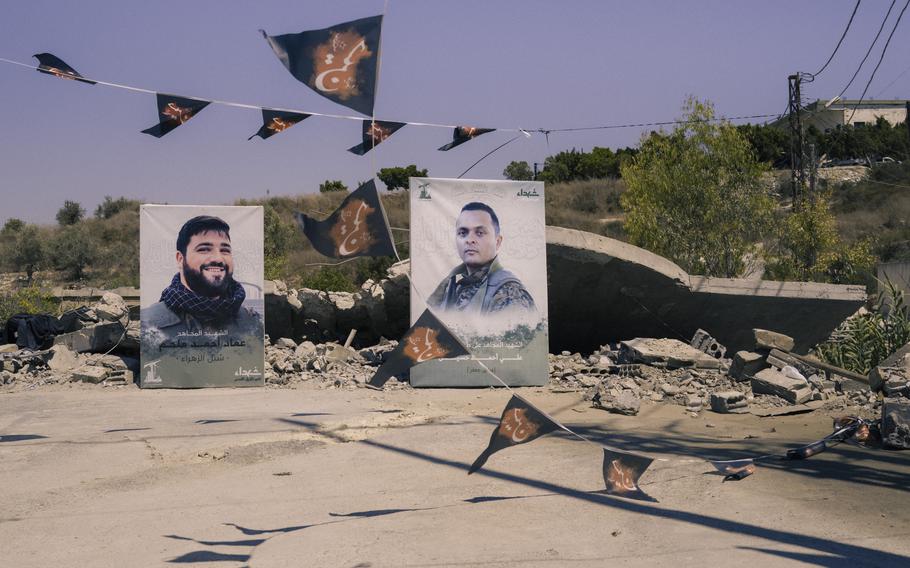
Images of Hezbollah fighters who died in the cross-border conflict with Israel are placed on the site of an Israeli airstrike in southern Lebanon’s Wadi Jilo. (Lorenzo Tugnoli for The Washington Post)
There had been previous bombings, “but not to this degree,” she said. “I hear drones overhead every two hours or so.” One could be heard circling as she spoke with reporters last week. She could not bring herself to leave Wadi Jilo, where her family was, her home.
The war just needed to end: “God willing, God willing, God willing,” she said.
Ibrahim Al Moussawi, a Lebanese parliament member representing Hezbollah, acknowledged that the suffering in the south and mass displacement had put pressure on the movement. Lebanon, in the midst of a long economic crisis marked by soaring inflation and spreading poverty, is barely able to assist the displaced, much less conceive of rebuilding areas destroyed by the conflict without massive foreign aid.
“We would have loved that our situation in Lebanon was in a better or a higher positive position to be engaged in war,” he said, adding that Hezbollah was providing assistance to displaced people, including with rent payments. The group was trying to balance Lebanon’s “vulnerabilities” with its decision to keep fighting, which he called a “moral duty, religious duty, national duty, responsibility as humans.”
Mneimneh, the independent lawmaker, said the weighty matters Hezbollah was deciding — over war and peace and foreign policy — were things that should be discussed in the parliament or by the country’s government.
“It is our duty to support the Palestinians as they strive for their own state, and to stand up against the genocide that took place in Gaza,” he said in an interview in his office, referring to Israel’s military offensive.
But it was for all Lebanese — rather than one party — “to come together and discuss the best ways to fulfill these goals, protecting the country and at the same time supporting the Palestinian cause,” Mneimneh said.